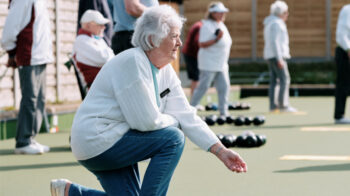INCLUSION IN SPORT
ISLANDERS AGED 65+

It is often assumed that older adults can’t be active; but by staying active in your older years, you can improve your overall health and reduce the risk of heart disease and strokes.
The UK’s Chief Medical Officer’s recommended guidelines advise that adults aged 65+ years old should:
- Aim to be physically active every day, even if it’s just light activity
- Do activities that improve strength, balance and flexibility on at least 2 days a week
- Do at least 150 minutes of moderate intensity activity a week or 75 minutes of vigorous intensity activity if you are already active, or a combination of both
- Reduce time spent sitting or lying down and break up long periods of not moving with some activity
This is important in Jersey, as local data tells us that islanders are significantly less likely to play sport or be active if they are aged 65+.
Reports from the Jersey Opinions and Lifestyle Survey (2021) and Active Lives Report (2021-2022) show that the percentage of islanders within the 55-74 and 75+ age groups who met the physical activity guidelines for their age group in 2021 was 18% less, compared to the same demographic in the UK. It is essential to the overall wellbeing within the community that the benefits of getting involved in sport and physical activity is shared and understood widely.
BARRIERS TO PARTICIPATION
- Affordability due to inflation effects on pensions
- Frustration with reduced physical abilities compared to their younger self (including stamina, strength, endurance, mobility)
- Some sports become too physically demanding for participants as they get older
- Transportation challenges when driving or using local transport
STRATEGIES TO ENCOURAGE PARTICIPATION
- Ask your participants how you can make your sport setting a safe, welcoming and inclusive environment for them to be and stay involved
- Offer lower intensity classes or sessions
- Reduce costs or membership fees for islanders aged 65+
- Utilised adapted sessions to increase longevity within sport e.g. walking football, walking netball, adapted cycling
- Create pathways into more accessible sport, for example Tennis > Padel, Water polo > Swimming
- Use easy-to-access facilities that cater to participant needs e.g. use of slopes and ramps
- Offer daytime sessions to attract retired participants
- Develop opportunities to engage participants in non-playing roles, e.g. coaching, officiating, volunteering on committee roles
- Use specialist equipment to support individuals with decreased mobility, for example bowling arms, recumbent bikes
